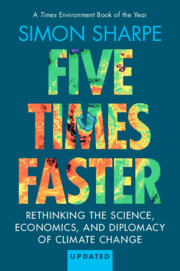 Five Times Faster
Five Times Faster from Part II - Economics
Published online by Cambridge University Press: 24 October 2024
The economics used by governments is based on ideas from the 1870s, when economists adopted the language of science, but not the method. To make the maths easy to solve, they assumed the economy was simple, predictable, and static. Nobody believes these assumptions are true, but they still shape analysis that informs policy. When the economy is complex, uncertain, and changing, this kind of analysis can lead us to bad decisions.
To save this book to your Kindle, first ensure [email protected] is added to your Approved Personal Document E-mail List under your Personal Document Settings on the Manage Your Content and Devices page of your Amazon account. Then enter the ‘name’ part of your Kindle email address below. Find out more about saving to your Kindle.
Note you can select to save to either the @free.kindle.com or @kindle.com variations. ‘@free.kindle.com’ emails are free but can only be saved to your device when it is connected to wi-fi. ‘@kindle.com’ emails can be delivered even when you are not connected to wi-fi, but note that service fees apply.
Find out more about the Kindle Personal Document Service.
To save content items to your account, please confirm that you agree to abide by our usage policies. If this is the first time you use this feature, you will be asked to authorise Cambridge Core to connect with your account. Find out more about saving content to Dropbox.
To save content items to your account, please confirm that you agree to abide by our usage policies. If this is the first time you use this feature, you will be asked to authorise Cambridge Core to connect with your account. Find out more about saving content to Google Drive.